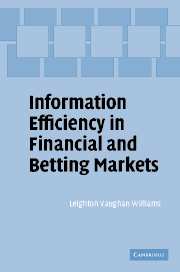Book contents
- Frontmatter
- Contents
- List of figures
- List of tables
- List of contributors
- Introduction
- Part I The concept of information efficiency
- Part II Selected readings
- 4 An assessment of quasi-arbitrage opportunities in two fixed-odds horse-race betting markets
- 5 The presence of favourites and biases in bookmakers' odds
- 6 Searching for semi-strong form inefficiency in the UK racetrack betting market
- 7 Models, markets, polls and pundits: a case study of information efficiency
- 8 Longshot bias: insights from the betting market on men's professional tennis
- 9 Biases and insider trading in exotic bets on thoroughbreds
- 10 On the improbability of information efficient parimutuel betting markets in the presence of heterogeneous beliefs
- 11 Modelling gambling demand in a laboratory casino: discovering the importance of individual-specific effects
- 12 Market efficiency of the 50–30–20–10 horse-racing spread betting market
- 13 Insider trading and bias in a market for state-contingent claims
- 14 Rationality and efficiency in lotto games
- 15 Efficiency of the odds on English professional football matches
- 16 Modelling distance preference in flat racing via average velocity
- 17 Testing for market efficiency in gambling markets: some observations and new statistical tests based on a bootstrap method
- 18 Information (in)efficiency in prediction markets
- Index
- References
6 - Searching for semi-strong form inefficiency in the UK racetrack betting market
Published online by Cambridge University Press: 09 July 2009
- Frontmatter
- Contents
- List of figures
- List of tables
- List of contributors
- Introduction
- Part I The concept of information efficiency
- Part II Selected readings
- 4 An assessment of quasi-arbitrage opportunities in two fixed-odds horse-race betting markets
- 5 The presence of favourites and biases in bookmakers' odds
- 6 Searching for semi-strong form inefficiency in the UK racetrack betting market
- 7 Models, markets, polls and pundits: a case study of information efficiency
- 8 Longshot bias: insights from the betting market on men's professional tennis
- 9 Biases and insider trading in exotic bets on thoroughbreds
- 10 On the improbability of information efficient parimutuel betting markets in the presence of heterogeneous beliefs
- 11 Modelling gambling demand in a laboratory casino: discovering the importance of individual-specific effects
- 12 Market efficiency of the 50–30–20–10 horse-racing spread betting market
- 13 Insider trading and bias in a market for state-contingent claims
- 14 Rationality and efficiency in lotto games
- 15 Efficiency of the odds on English professional football matches
- 16 Modelling distance preference in flat racing via average velocity
- 17 Testing for market efficiency in gambling markets: some observations and new statistical tests based on a bootstrap method
- 18 Information (in)efficiency in prediction markets
- Index
- References
Summary
While there is a large body of literature devoted to the study of various aspects of the efficiency of betting markets, and especially horse-race betting markets, there are contexts for and forms of analysis that remain significantly underrepresented. Hence, studies which seek to identify weak form inefficiency are relatively common compared with those which investigate the presence of semi-strong or strong form inefficiency. Equally, the dominant means of analysis has been to explore opportunities for pockets of abnormal returns associated with a single variable or a closely related set of variables, rather than a wider set of factors. This study seeks to redress these imbalances in the body of empirical work by focusing on semi-strong form efficiency of horse-race betting markets, using a multi-variable approach seen previously in only a limited number of studies.
Furthermore, while the overwhelmingly dominant setting for betting market analysis has been the US parimutuel market, this contribution focuses instead on the UK bookmaker market. The appeal of investigating the UK context is based on a number of institutional factors which discriminate it markedly from the US setting and which, prima facie, might give grounds for expecting differences in efficiency characteristics.
The following section offers a brief review of the literature relating to betting market efficiency and charts those characteristics of the UK horse-race betting market context which render it distinctive from other settings for empirical enquiry.
- Type
- Chapter
- Information
- Information Efficiency in Financial and Betting Markets , pp. 179 - 192Publisher: Cambridge University PressPrint publication year: 2005
References
- 3
- Cited by



